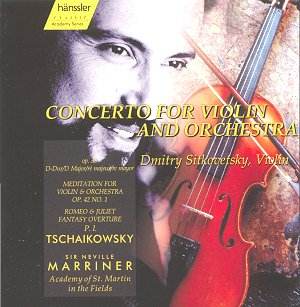TCHAIKOVSKY
Violin Concerto in D, op.35
Meditation, op.42/1
Romeo and Juliet: Fantasy-Overture
 Dmitry Sitkovetsky (violin)
Dmitry Sitkovetsky (violin)
Academy of St. Martin in the Fields/Sir Neville Marriner
 Hänssler CD 98.346
[68'08"]
Hänssler CD 98.346
[68'08"]
Crotchet
Amazon
UK

A companion to the same artists' Sibelius
disc, in which the violin concerto (plus, in this case, the
Meditation which was its original second movement) is coupled with
Shakespeare-inspired orchestral music. Having questioned the balance between
soloist and orchestra in the Sibelius, I am happy to report that the present
recording is excellent in every respect.
After a curiously inconsequential opening flourish Sitkovetsky provides much
fine playing. Unfortunately this performance shares with the Sibelius a tendency
on the soloist's part to get slower at the least opportunity, and here the
damage is not limited to the first movement since the finale, too, is steered
into the doldrums whenever a lyrical theme comes into sight. The slow movement
is less affected and the Meditation is a complete success.
The orchestra has a strictly accompanying role but it has to be said that,
when it has something of its own to do, Sir Neville does it rather blandly.
The wind-playing lacks pungency of timbre and the ear expects the open fifths
that introduce the finale's second subject to rasp more. Marriner's strengths
in Tchaikovsky lie in nicely sprung balletic rhythms (there are some very
winning moments in the Meditation where the violin rides over chugging
triplets) and a certain elegance of phrasing. It need hardly be said that
this is not enough for Romeo and Juliet and one wonders if he is
deliberately setting out to expunge the work of its extra-musical Shakespearian
connections. For much of the time Tchaikovsky's own passion carries the day
but there are moments which almost undermined my faith in the piece. The
alternating string and wind chords before the fight breaks out have no meaning
if not animated by some sort of imaginative participation on the conductor's
part and the lead into the first appearance of the love theme emerges as
mere throat-clearing.
As a comparison I listened to Boult in Romeo (a World Record Club
original which turns up in EMI compilations from time to time), not because
Boult was supreme in Tchaikovsky (for a full baring of the composer's neuroses
one would go to the likes of Mravinsky or Markevich) but because his concern
for structural logic and dislike of rhetoric might have been expected to
lead him in the same direction as Marriner. But not so; Boult was too great
a musician not to grasp the fundamental point that without an element of
self-dramatisation this sort of music does not get off the ground. There
is tension right from the start, the love-theme has a recognisably Tchaikovskian
yearning and the performance swirls and surges to an overwhelming climax
that leaves the listener in no doubt that this is one of the most passionate
and tragic love stories ever told. I wish I could find some compensating
advantages in Marriner's approach but I have to conclude that it is basically
misconceived.
In short, Sitkovetsky's admirers will be pleased to hear him in the two concerted
pieces and we may hope that he will learn to express his love of the music
less indulgently in the years to come, but Romeo really will not do.
Christopher Howell

